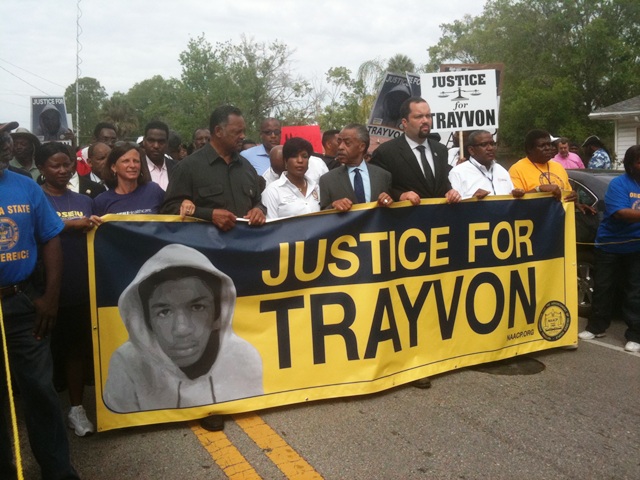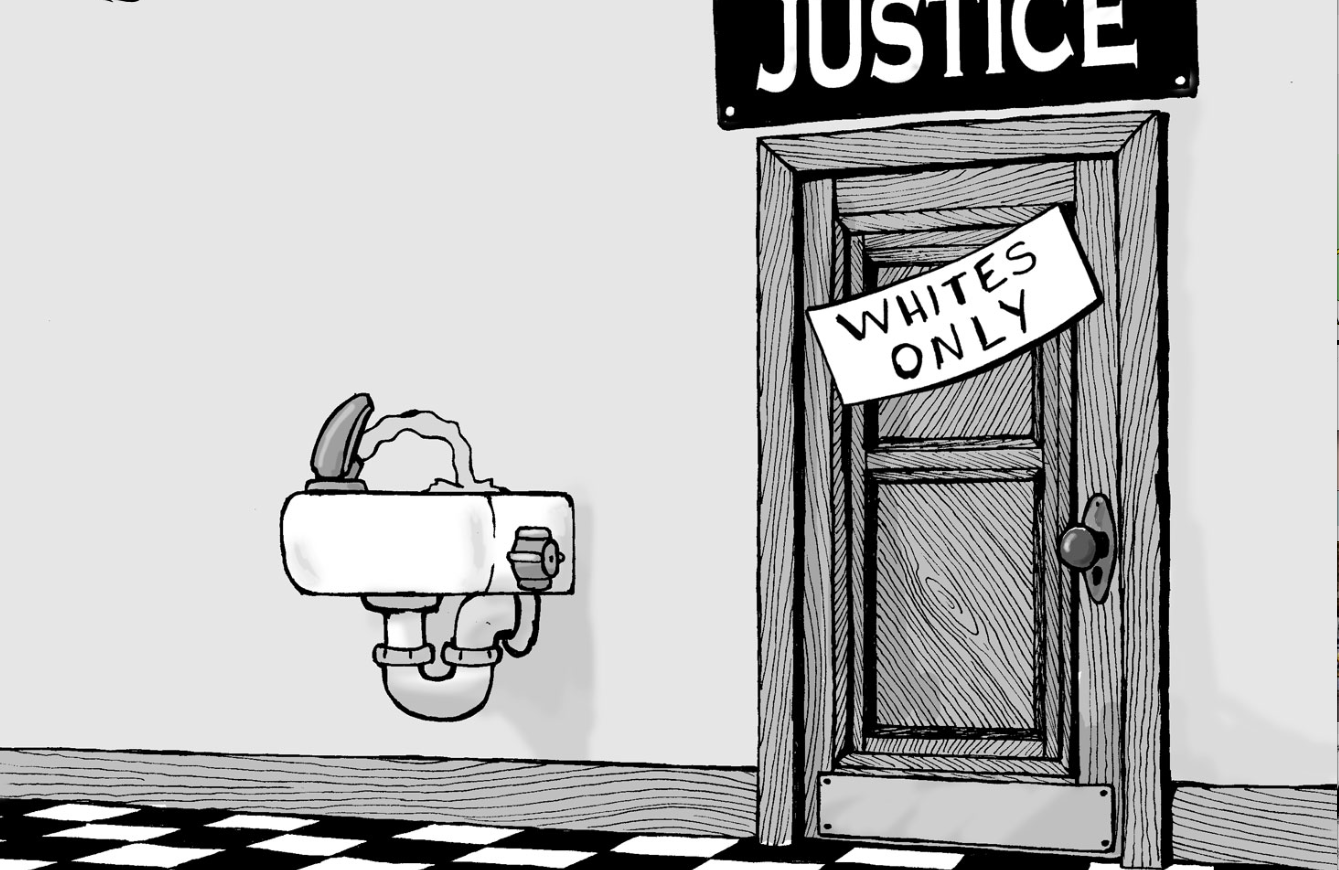Beyonce has urged supporters of Trayvon Martin to be inspired by the protests that followed the death of another black teenager, Emmett Till. So who was Till?
After attending an event in New York in memory of teenager Martin, who was shot dead in Florida, the pop singer wrote a message on her website.
“We have made so much progress and cannot allow hatred and racism to divide us,” she wrote. “When we all join together, people of all races, we have the power to change the world we live in. We must fight for Trayvon the same way the generation before us fought for Emmett Till.”
In the summer of 1955, the 14-year-old Till was far from home when his life ended in a most violent way, apparently for whistling at a white woman.
Dragged from his bed at his uncle’s home in a small Mississippi town, he was beaten so badly that his face was unrecognisable when the corpse was recovered from the river three days later. He had been shot in the head and his body tied to a 70lb (32kg) fan.
The two men known locally to have carried out the attack were acquitted of murder. The following year, they admitted responsibility in a magazine interview, but said they had done nothing wrong.
“There was a civil rights movement before Emmett Till came along,” says David Beito, a professor of history at the University of Alabama. “But the outrage galvanised the movement in ways that hadn’t occurred before.”
Till’s mother insisted the coffin remain open so the extent of his injuries could be seen by the thousands of people who paid their respects in Chicago. A weekly magazine, Jet, aimed at African Americans, published gruesome photographs of his beaten face, to show the brutality of the attack.
There were rallies across the country at which Till’s mother, Mamie, spoke to crowds numbering 10-20,000 people.
A few months later, Rosa Parks refused to give up her seat on the bus to a white passenger, in one of the most famous protests in history. She later said she had Till in mind as she did so, having just attended a Till rally hosted by a then unknown minister called Martin Luther King.
Till’s death is also thought to have played a part in the congressional discussions that led to the 1957 Civil Rights Act, which increased African American voting rights.
The answer:
Till was a 14-year-old beaten and killed by two white men in 1955 in Mississippi
The men were acquitted of his murder
The protests that followed the killing, and the trial, galvanised the civil rights movement
His death also inspired activist Rosa Parks
He was the first martyr of the movement and he became the face of it, says Peniel Joseph, author of Waiting ‘Til the Midnight Hour – A Narrative History of Black Power in America. “The picture of him with the hat and the little shirt and tie was widely circulated during that period.”
Little is known about Till himself. He was born in 1941 in a town outside Chicago, but his parents became estranged when he was still a baby.
He had polio as a child and then developed a stutter. When he was 10, he moved to Chicago itself and four years later, he spent the summer with his mother’s brother in the small Delta community of Money, Mississippi.
On 24 August, he went into a local store to buy some bubblegum. A 21-year-old white woman, Carolyn Bryant, was working there while her husband, the shopkeeper, was away. What happened between them is not clear but when her husband returned, he was led to believe that Till had whistled at his wife.
Roy Bryant and JW Milam took their revenge, in a way that soon made national and international headlines.
Artists who have invoked Till:
Poet Langston Hughes
Writers William Faulkner and Toni Morrison
Singers Bob Dylan and Emmylou Harris
And there’s speculation his story inspired Harper Lee’s To Kill A Mockingbird
The killing was one of two moments that launched the push for equality in the US, says Professor Clive Webb of the University of Sussex, who has studied the influence of the American civil rights movement on British race relations. The other happened a year earlier when a US Supreme Court ruling – sometimes known as the Brown decision – led to the integration of state schools.
“It’s not only that Till died. There are any number of African Americans who were lynched and Mississippi was the most-lynched state.
“It’s the timing, coming after the hopes and expectations of the Brown decision. And it’s the power of the visual representation of the lynching [the open casket and the magazine article] that together make a combustible brew.”

His death and the outcome of the trial had an impact in Britain, says Webb. At a time of geopolitical instability, concern was expressed in some newspapers that Britain’s key ally risked losing support in Africa and Asia if these stories of racial intolerance continued to make headlines.
Four years later, Till’s murder was invoked in the death of an Antiguan immigrant in London, Kelso Cochrane. He was killed by a group of white youths and his murder left unsolved, amid accusations that the police were not taking it seriously.
“As a way of rallying public outrage against what’s happened, black organisations in the UK evoked the spectre of Emmett Till,” says Webb.
His story is still well known in his home country, where his name has continually appeared in poetry, song, rap and television over the years. But in the UK, he is a forgotten figure, eclipsed by the likes of Parks, King and Malcolm X in the pantheon of civil rights heroes.
“We haven’t had a Mississippi Burning, a Hollywood version of this death, to engage our collective memories,” says Webb. And his tragic story doesn’t fit with the simplest version of the civil rights narrative, which is about disempowered people overcoming remarkable obstacles to claim their rights.
“So we latch on to Parks, King and Malcolm X. But Till doesn’t have the same agency as other icons.”
Reporting by Tom Geoghegan for the BBC.











May those two – Emmett & Trayvon – and all others who have suffered this brutality at the hands of these inhumanity, rest is peace!
When we call what happened to Emmett & Trayvon inhumane, we dignify the act. Inhumane sounds beautiful in the context of these atrocities. I hope by ‘inhumane’ we mean not human – animalistic. What the perpetrators of these kinds of heinous crimes against humans are, is not inhumane, it is just plainly an act of an animal!
So Emmett was killed over ‘blinking at a white lady?’ Thanks goodness, I blink at them all day now at no cost. How insecure?
I think a lot of us are shaking our heads at the inconsistencies of the later case: If as Zimmerman claimed, he felt threatened enough to call the police and was told not to leave his vehicle — why did he? And if he felt so threatened but still left his car — wouldn’t he do so with his gun at the ready? Okay, so he says it was underneath his jacket and his shirt, hidden under the waistband in the back of his pants…but yet he was still able to reach it when he was pinned on his back on the ground to shoot Trayvon Martin in the heart? Zimmerman’s account and his behavior do not add up and what upsets me is that the verdict essentially abets Florida’s “Stand and Deliver Law” such that anyone can concoct a story without witnesses — and get away with murder.
I fail to understand why people think Zimmerman is at fault here? What our judicial system offers is exactly what Zimmerman took advantage – yes, make up or tell your story!
But that has nothing to do with the verdict.
The real elephants with brains the size of ants, are the jury. In juror B37’s comments, it seems what really is setting America back is ignorance and stupidity – there’s too many folks like juror B37 who are full of it and would never even know it.
Sad indeed!
In both of these cases involving Emmett and Trayvon, these murderers did not get away – white jurors set them free!
Lesson to black folks I guess – how can you be so naive as to even accept that a hearing like the Zimmerman trial should even proceed without demonstrations to make sure the jury is representative of America? Of Sanford, Florida?
The moment I heard the Jury was all white (forget the comments about one juror being Hispanic – what is that supposed to mean? That she cannot be white?) I didn’t need Einstein to extrapolate what the verdict would be.
Perhaps Black folks in this country will take it a whole lot more seriously next time – justice is not accorded anyone, it is fought for. I hope the fight continues!
Incredibly sad. Outrageously unjust. The only good thing about the prosecutors case was the closing argument, and it failed. In theirs, the defense asked the jurors to put emotions and sentiments aside, and they must have, because they acquitted. These six women have hearts of stone – I can’t see how they could have called it against this 17 year old who just went out to buy candy and a soda, was pursued by a vigilante with a gun, and was killed. Too simplistic seemingly – but those are the basic facts. The aggressor was the guy with the gun, they fought, the gun proved lethal, and ended a young man’s life – a boy who had no chance to tell his side of the story.
The fact that the police drug tested the dead victim and not the shooter is only one of the most amazing aspects of this, and that says it all. What miserable excuse did the cops give for that?
What does the world think of the US now? Not much of an example of justice and respect for law, as we send our troops around the globe.
Why can’t black folks in this country build a solid community with high profile lawyers, engineers, doctors, etc. committed to their own community. African Americans need to build their own formidable institutions and stop groping over Emmett & Trayvon – that will be the best legacy and the fastest way to achieve equality.
The killing of Trayvon is a catastrophe! A shame on America! I big fat shame on America’s so-called ‘post-racial’ bravura. A really bit fat Shame.